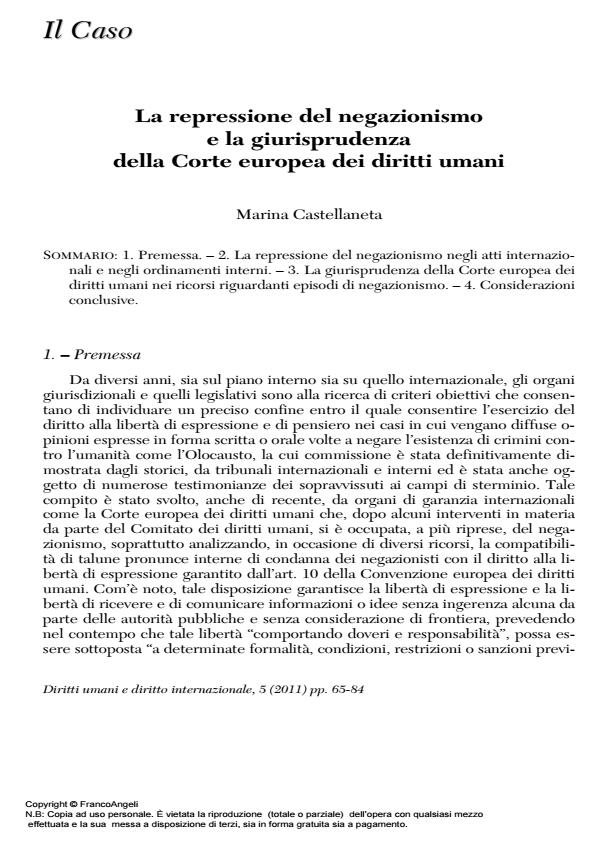La repressione del negazionismo e la giurisprudenza della Corte europea dei diritti umani
Titolo Rivista DIRITTI UMANI E DIRITTO INTERNAZIONALE
Autori/Curatori Marina Castellaneta
Anno di pubblicazione 2011 Fascicolo 2011/1
Lingua Italiano Numero pagine 20 P. 65-84 Dimensione file 475 KB
DOI 10.3280/DUDI2011-001003
Il DOI è il codice a barre della proprietà intellettuale: per saperne di più
clicca qui
Qui sotto puoi vedere in anteprima la prima pagina di questo articolo.
Se questo articolo ti interessa, lo puoi acquistare (e scaricare in formato pdf) seguendo le facili indicazioni per acquistare il download credit. Acquista Download Credits per scaricare questo Articolo in formato PDF

FrancoAngeli è membro della Publishers International Linking Association, Inc (PILA)associazione indipendente e non profit per facilitare (attraverso i servizi tecnologici implementati da CrossRef.org) l’accesso degli studiosi ai contenuti digitali nelle pubblicazioni professionali e scientifiche
The spread of the phenomenon of Holocaust denial, which has a strong discriminatory nature has led the international community to deal with the identification of limits on the freedom of expression in cases in which opinions are disseminated to deny the existence of crimes against humanity such as the Holocaust, established without any doubt on the historical level, also thanks to international and domestic courts. Both on the international and on the internal legal systems documents were adopted prohibiting the absolute denial of historical facts with regard to knowledge established beyond any doubt, limiting, in these cases, the right to freedom of expression. Such prohibitions were examined by the European Court of Human Rights that in several judgments has considered in accordance with Article 10 of the Human Rights Convention the punishment on domestic level of the perpetrators of theses denying the Holocaust, evaluating those views as religious and racial discrimination. Accordingly, the Court held that the denial of clearly established facts such as the Holocaust should be removed from the protection of Article 10, also thanks to Article 17 (Prohibition of abuse of rights). The Court on several occasions has considered the statements in which are supported denial of the existence of crimes against the Holocaust particularly serious and has applied to Article 17 to ensure the system and the values expressed in the Convention. Therefore, in the light of ECHR case-law it can be maintained that the Holocaust denial theories do not fall within the scope ratione materiae of the Convention as contrary to the fundamental values of democracy and of the Convention, as expressed in its preambular, namely justice and peace.
Marina Castellaneta, La repressione del negazionismo e la giurisprudenza della Corte europea dei diritti umani in "DIRITTI UMANI E DIRITTO INTERNAZIONALE" 1/2011, pp 65-84, DOI: 10.3280/DUDI2011-001003